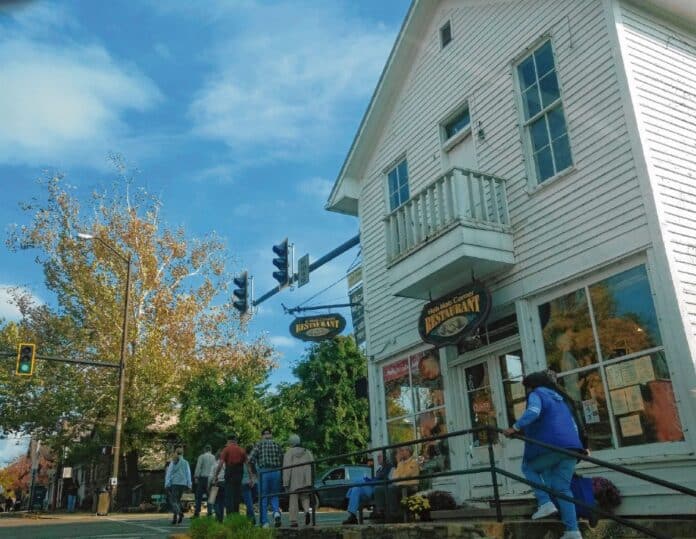
Nashville, to tourists, is a getaway. It’s shopping, it’s outdoor adventure, it’s relaxing in relative quiet.
Is that what Nashville is to the people who are here year-round?
And is there something more the Nashville Town Council can do to support those residents, so the ones here can stay and more could join them?
Since July, the town council has been working through a series of “strategic direction” meetings designed to encourage the town’s elected officials to be proactive about policies they enact.
On Wednesday night, Feb. 19, the council is specifically inviting residents to participate in a meeting about “Nashville’s brand.”
Dax Norton, strategic direction adviser for the town, has been encouraging the council to think about this topic since last summer when he asked the council to hire him.
“Tourism economic development is much different than community development,” he said at the June meeting in which his contract was approved. “Community development is really for your internal audience, your residents that live here, what betters their quality of life. Economic development is a subset of that. I don’t like to use the word ‘economic development.’ It’s more like ‘economic vitality.’ People hear ‘development’ and think tract neighborhoods and 100,000-square-foot buildings, and that’s not necessarily what that means. What the tourism folks do, that compliments what we do,” he said.
“There are a lot of great articles out there that say if the residents aren’t happy, or if the residents don’t have a great quality of life, you will lose the tourists eventually, regardless of where you are.”
Town residents often have different needs than town visitors.
The Brown County Convention and Visitors Bureau has done several studies on Nashville’s “brand,” promotional taglines and marketing materials, but those were aimed at attracting visitors, not necessarily residents. Town staff members in the Jan. 29 strategic direction meeting couldn’t recall if the town had ever undertaken a similar effort, but focused on residents.
The brand would be a consistent message and feel about living in Nashville that would be shown in multiple ways, from the logos on town government vehicles and signatures on staff’s email, to the “story” that the town communicates through its web presence to the world. It’s the message of “who we are, why we are that, and why we are proud of that,” Norton explained.
Before the town could do something like that, they’d need the input of residents, said town council member Nancy Crocker.
Council members were challenged to invite at least three people each to the Feb. 19 meeting. Though town residents are the focus, people who don’t live in town limits are welcome, too, as “Brown County” and “Nashville” are sometimes viewed interchangeably.
People who attend the meeting will be asked to answer questions about what their perceived brand of Nashville is.
The council also talked about having a different meeting for people who don’t live here, to ask them the same questions and compare the answers.
The answers will help the town move forward with other discussions about the future of Nashville, such as developing “human capital” (retaining residents, attracting new ones and reducing “brain drain”), planning for “infill” in the town (rethinking the use of empty lots or building spaces), and supporting existing businesses.
Nashville is unusual in that the reason for its economic existence hasn’t really changed, he told the council in its December strategic direction meeting. He’s asked council members to think about what those reasons are, whether or not our economy and the Nashville we know can be sustained, and how the council could be forward-thinking and supportive.
The Feb. 19 meeting will start at 6 p.m. at Town Hall, 200 Commercial St.
[sc:pullout-title pullout-title=”Questions to consider” ][sc:pullout-text-begin]
- What is the internal perception of Nashville?
- What is the external perception of Nashville?
- What do you (residents) like/feel about Nashville? (one- or two-word answer)
- What do you (visitors) like/feel about Nashville? (one- or two-word answer)
- What is Nashville’s current niche? Is there a single, narrowly focused niche? Should this change?
- What differentiates Nashville from other communities?
- What does the perceived brand promise?
- Is Nashville delivering the promises of the current perceived brand?
- Are the current residents ambassadors of the current brand? [sc:pullout-text-end]
[sc:pullout-title pullout-title=”Communicating with constituents” ][sc:pullout-text-begin]
Communication between town government and the public is part of the larger discussion town leaders have been having about supporting residents.
Council members and staff spent much of their Jan. 29 strategic planning session talking about procedures for communicating internally and through chain of command. But the town also is working on new methods of communicating externally, with the public.
Last month, Town Hall started sending out “interactive agendas” with links to documents that will be discussed during upcoming meetings, so that residents can come prepared with questions about them if they wish. Those are posted on the town’s website, townofnashville.org, and on bcdemocrat.com under the “government calendar” file.
The town also is working on setting up live webcasts of meetings from Town Hall, which would also be archived for later viewing. Ideally, those watching from home would be able to ask questions that council members could answer during the meeting, but webcast details haven’t been worked out yet.
Town government does not have a social media presence, except for the police department. Strategic Direction Adviser Dax Norton suggested they think about that — as a way to reach residents with information, not to engage them in debates or conversations that would be better done in person.
Norton committed to the council that he’d have a communication for them to look over within 30 days.
[sc:pullout-text-end]



